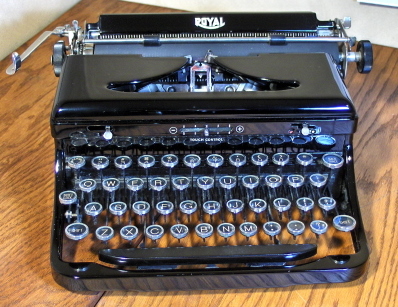
Royal Typewriter, circa 1950s. Photo credit: mrtypewriter.tripod.com.
A year after I’d lost him, I taught myself to touch-type. I relished our old Royal, his old Royal. I loved how the keys plunked and the typebars clattered, how the letters appeared neatly on the line, one after the other. I reveled in the ping of the bell and the thwack of the carriage return. By the time I finished the lessons, it was not the typewriter’s music I craved but its lyrics: a powerful word, a deft sentence, a paragraph that leaves you breathless.
I loved how the keys plunked and the typebars clattered, the ping of the bell and the thwack of the carriage return.
Although I knew my father had written, I didn’t expect the thick envelope of manuscripts my mother presented me when I turned forty. From it spilled war stories and postwar stories, war poems and love poems, the first chapter of a novel. He’d dreamed of a life as a writer and, judging by his professors’ comments, showed promise. Then he joined my grandfather’s warehouse business so he could marry her and have me. He packed those pages away, planning, I suppose, to return to them when the business got to its feet and we kids could make our own way to school.
My manager and my writing mentor want me to write something commercial instead of another passion project. I see their point. But I conjure the smoky late-night staccato of my father at the Royal. No. I don’t think so.
John Zussman is a creative and corporate storyteller and a co-founder of Retrospect.
John Unger Zussman is a creative and corporate storyteller and a co-founder of Retrospect.



I hope you find some material in your father’s work that you can use so that it may see the light after all.
Thanks, Lutz. A few years ago on my blog, I posted an essay by my father called “Upon Reaching the Age of Three.” So he lives on, on the Internet!
https://asitoughttobe.com/2010/10/06/upon-reaching-the-age-of-three/
Uncanny, John, although perhaps not. There are no coincidences. I learned how to touch type a big old Royal, on one of those mechanical beasts with the ubiquitous courier 12-point font. My old man gave me an Underwood that I used in college. When he died, I inherited a similar sheaf of pages. They were fascinating, recounting episodes of his Depression years at sea.
Perhaps we should both don our fedoras and have a type-off. Write on!
John,
This is powerful and told in a way that went right to my heart and stopped my breath for a short time. At first I was surprise by the way you started the story but by the end it seemed like the best way to begin.
Thanks so much, Rosie. I actually wrote this in Gillian Kendall’s writing workshop at Esalen. So you were there!
Moving, musical…a beautiful narrative and tribute to your lost father, love of the perfect phrase and evocative of a time gone by.
Thanks for your kind words, Betsy; they mean a lot.
John, I just came across this story; somehow missed it before when reading through Retrospect. It made me realize how much I miss typewriters myself, and how I’ve sometimes considered getting one off ebay to write my next book. Maybe when I turn the corner to fiction, I’ll do that. Seems like good fiction should come from a typewriter. I began my newsroom career in 1968 when the last of the Royal manuals were going out the door, to be replaced by electrics. Then same the IBM Selectrics and then the computers — or “video display terminals” (VDTs) as we called them then. But as the technology has changed, so has some of the magic that came from those old Royal keyboards. Thanks for the memory!
Thanks so much, Jim. I love the look and feel of those old typewritten manuscripts but, truth be told, when I remember the rigamarole of manual carriage returns, White-Out, and retyping, I’m forever thankful that I can write and edit my work on a computer. I only wish my father had lived to do it as well.
I confess, however, that when I free-write, I do it longhand, if you can believe it. Somehow it seems like the thoughts flow more freely that way. Go figure.